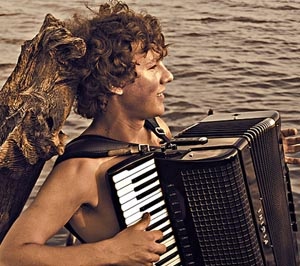A nice conversation between Romano Viazzani and Martynas Levickis
 Martynas is part of a “golden generation” of accordionists who studied and continue to study at the royal Academy of Music’s successful accordion department under Owen Murray; a generation who along with Levickis has included Ksenija Sidorova, Borut Zagoranski and Milos Milivojevic to name but a few. Currently plastered all over the British national press, Levickis is fresh from his victorious number one hit album in the UK Classical hit parade entitled Martynas when we meet for an interview.
Martynas is part of a “golden generation” of accordionists who studied and continue to study at the royal Academy of Music’s successful accordion department under Owen Murray; a generation who along with Levickis has included Ksenija Sidorova, Borut Zagoranski and Milos Milivojevic to name but a few. Currently plastered all over the British national press, Levickis is fresh from his victorious number one hit album in the UK Classical hit parade entitled Martynas when we meet for an interview.
R: Congratulations on your huge success Martynas. I’m sure that every accordionist in the English-speaking world and beyond will be jumping for joy at the news of an accordionist at number one in the UK Classical charts. I was already jumping for joy when I heard that Decca was doing an accordion album with you because it has been a long time since they did one. I may be wrong but I think the last one was by our dear, recently-departed Gervasio Marcosignori some fifty-or-so years ago. They are every different albums and comparisons reflect the times in which they were recorded. Marcosignori’s Accordion Showpieces album was recorded at a time when the accordion was trying to establish itself in the classical and contemporary music scene without losing its traditional fan base. Consequently, along with one or two continental café-style pieces Marcosignori slipped in quite a few pieces by modern composers by composers like Felice Fugazza’s Preludio e Fuga, Luigi Ferrari Trecate’s Pantomima Umoristica and Balletomania by Melocchi. Your album instead includes accordion arrangements of popular classics which have a broad appeal but also some more classical, or rather, instrumental takes on music by Lady Gaga and Katy Perry.
M: The repertoire choices in the album are not as unusual even though it is being claimed that it is something that hasn’t been played or heard on accordion before. I think those choices are quite safe for marketing, which I allowed to happen because these people work in this industry and they wanted it to be successful. This contract with Decca is for five albums so if it happens I would love to explore much more towards the edges of the repertoire for the third, fourth or fifth album if I can do that. There are so many people I’m working with that sometimes it is difficult to keep up with one’s own ideas.
R: It’s interesting. What seems to happen in the industry is that some artists do the “substance” works first and then later do “crossover” into the world of popular classics, jazz, pop etc, or, they do a popular album to get a foot in the door so the industry can test out the artist first and then the artist can prove their worth further along the line.
M: I really hope that this is what will happen. That’s what happened in Lithuania when I did Lithuania’s Got Talent when I sold myself doing some popular stuff on TV and got some attention from people and sponsors and then later I invited those people to concert halls, big concert halls with full houses and people would have to listen to Bach, to Also Sprach Zarathustra, to Flashing, Scarlatti, whatever I played… and it worked!… because maybe people didn’t know what to expect. Maybe they were expecting me to play the same kind of stuff I did on TV but I sort of cheated. This formula I think could work in the UK too maybe. Maybe, we’ll see. I already have some ideas for the second album. I’m open to many ideas. Like now, I’m doing the Sunday Squeeze which is a YouTube video series which is hard but I have to do it as a marketing tool. I do pop song arrangements every Sunday just by myself. Whatever is in the UK charts and it’s quite exhausting. I’m positive about it and I have to keep some integrity which is really important to me. With so many people worrying about marketing it’s easy to lose perspective and not do the right thing.
R: I can empathise with that. Even if it is only pop music you’re playing one still has to do one’s best with it and interpret it convincingly in a way that works on accordion which means you have to spend hours arranging it and practising it or finding a unique take on the music. It’s very exhausting.
M: But hopefully it will mean a better future for accordionists.
R: Well I always thought that it would be your generation that would manage to do this. It’s distant enough from the “old” image of the accordion. In the 1960s and 70s the accordion had an image associated with an old world order that people wanted to forget about. Then the Beatles and others came along with their guitars (John Lennon played accordion by the way) coupled with the sexual liberation of the 60s and the start of youth pop culture, and the accordion had no place in this brave new world. What Youtube has shown is that people do like to listen to music which perhaps didn’t get a chance because the record companies dictated what they thought people would buy. Youtube is full of accordionists doing stuff that isn’t French musette or other things normally associated with accordion in the UK. Take a chamber piece like Vivaldi’s 1st movement from Winter from The Four Seasons. We’ve both recorded that on Youtube and they both have hits numbering in the hundreds of thousands. More hits than the regular accordion fare. So was it your idea to do some Lady Gaga on accordion?
M: The initial idea was suggested by my friend back home in Lithuania because last year I released this album called i-accordion which presented all the pop tunes played on accordion only so I was already recording that and I was thinking about what to record next and my friend said, “Why don’t you play Lady Gaga? There’s this song”. I didn’t even know that song at the time. So I listened to it and could see the potential immediately so last year when I was meeting my manager etc. I played him the song and then played it on accordion and they all really liked it.
R: It works really well and it’s played really well. I saw you do it on BBC Breakfast and it came across well and really impressive. You handled that interview very well too.
M: That interview was really stressful for me actually. I had a few media training sessions to help me to understand how to talk on the show. Nothing happened the way it was supposed to. It was really quick. Anyway it was great to get the exposure. I just to need to build up a little bit more information.
R: Charlie Stayt played your accordion! The video clip they aired too was very appealing. La Forza del Destino Overture everyone knows from various adverts on TV and films too. Good thinking actually as it’s also Verdi’s bicentenery this year along with Wagner and it’s Benjamin Britten’s centenary too. You’ll have to record some Wagner on accordion now too!
M: I have some crazy ideas actually! And I’m doing some Britten soon actually. Just one small piece.
R: Whilst the CD features “popular classics” as well as some pop hits they are extremely well played and underneath it all there is an accordionist of substance. I have heard you play pieces of incredible technical complexity and which require intense emotional interpretation. In the UK we have just formed UKAAT (UK Association of Accordion Teachers) which thankfully you too are a part of. For our younger student readers I would like to ask you, how much has your educational grounding has really helped you to arrive where you have today?
M: A lot I think. Without it I wouldn’t be able to be convincing at all. For example, in these takes on popular classical music, I’m sure many people could do that, there is nothing that is very technically complicated, but there is something underneath that.
R: Absolutely, it feels like the grounding you’ve had, your training has given you the confidence to play those popular classics and at the same time transmitting that that music is safe in your hands, that there is something deeper to the person playing this music. In this age of talent shows sometimes someone with a good voice may win a competition but then to have longevity you need substance behind the façade otherwise it’s a steep learning curve in the media spotlight trying to catch up and move on to subsequent albums.
M:I think my grounding in Lithuania served me well but I think I was quite transformed when I came to the Royal Academy in London because I hadn’t played much contemporary music but now I was in the right place and Owen Murray was a huge inspiration to me. He taught me to look for those nuances in the music and as I say in my album, I learned to listen and hear from Owen Murray which is essential in music. So all those little details hidden in the music I suppose in every performance of mine come across. I’m sure I wouldn’t be able to do this without the Classical training and people can tell that. People sometimes say to me after a concert, “this is nice music, but we can tell that you are classically trained” and that makes me very happy. There is a funny story actually. At my Festival Hall recital in February, which had a fairly serious classical contemporary core but at the end I played two pieces with the violinist from my album and a seventy-year-old man came up to me after the concert and said “Why didn’t you play Lady Gaga!” You never know what people expect.
Questo post è disponibile anche in: Italian

 English
English Italiano
Italiano 





Leave a comment
You must be logged in to post a comment.